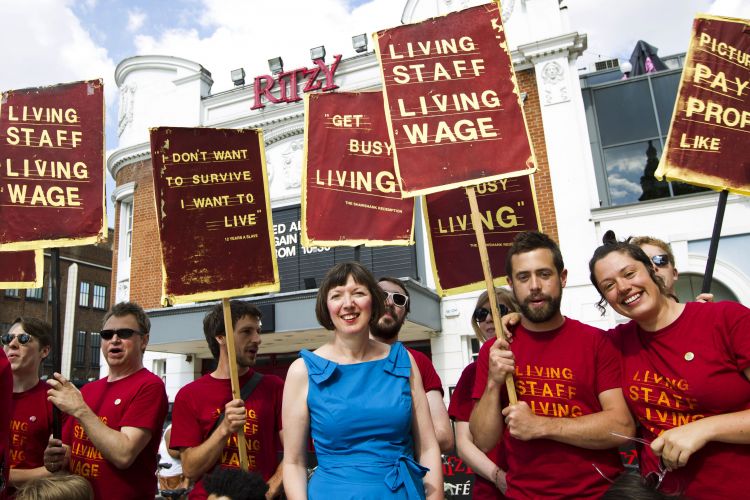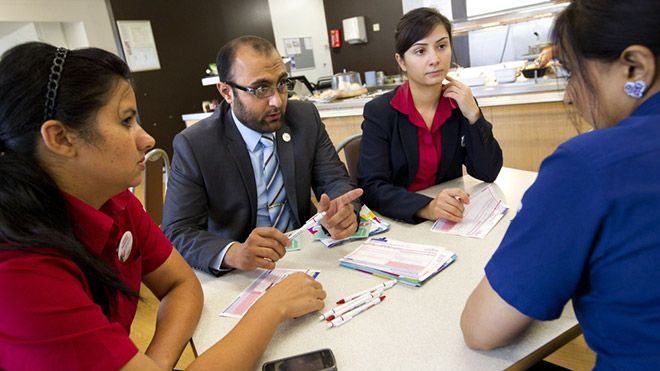Building stronger unions

Our aims:
- Get the union movement growing again
- Transform our trade unions so they can better recruit and represent a new generation of workers – particularly younger and private sector workers
- Fight any further attempts to restrict trade union rights
- Win new rights for unions to go into any workplace
What’s the issue?
When a group of workers act and speak together, their employer has to listen. That’s how unions make things better at work. It’s called collective bargaining – and it’s proven to raise wages and make sure working people get decent terms and conditions at work.
We need to spread collective bargaining so more workers in more companies are included. That’s the best way to get wages rising across the economy – and it’s crucial if you want to build a more equal society.
But unions are held back by old-fashioned laws that limit what we can do. And the 2016 trade union act has only added more restrictions and more red tape for unions. That’s why we want to win new rights for unions to go into any workplace, use digital to engage our members and make sure low-wage sectors are covered by collective agreements.
And, as always, when we’re under attack, we must respond by growing stronger and getting bigger. A growing union movement is the best response to the rise in insecure work, zero hours contracts and bogus self-employment.
The biggest gap in our movement is younger private sector workers. Nearly 90% of under 30s on low to median incomes work in the private sector — but just 6.3% of them are trade unions. If current trends continue, overall, across all sectors, less than 20 per cent of employees will be in a union by 2030.
Younger workers are more likely to be poorly paid, unemployed or underemployed, or have an insecure contract. Getting more younger workers covered by collective bargaining will change things. But to do this trade unionism has to change itself, so it works for younger workers.
The TUC and our big private sector unions are working on an ambitious programme to reconnect our movement with young workers. Right now we’re prototyping new ways to make trade unionism feel relevant to the lives of today’s younger workers. We want to launch a pilot in mid-2018.
Alongside this, we support the brilliant organising efforts of our member trade unions – like at Sports Direct, McDonalds, Hermes and the Ritzy Cinemas. We help build the skills and capacity of our brilliant union reps. And we’re working with unions to deliver a transformation in trade union digital, to help unions meet members’ expectations and be fit for the future.
Related reports:
Living for the Weekend - Understanding Britain’s young core workers
I feel like I can’t change anything
Resources
TUC Digital healthcheck
Related blog posts:

To reach young workers, trade unionists need to step outside their comfort zone
Clare Coatman manages the TUC’s programme to reach younger workers. She tells her own story of exploitation at work and how that spurred her to join a union and make a difference.

Organising music’s precarious workforce: What gigging workers can teach gig workers
The Musicians’ Union has 30,000 members the majority of whom are self-employed and have portfolio careers: gigging, teaching, working in freelance orchestras, session musicians or composers and songwriters working from home.

Union reps are good for workers and employers. And we can prove it!
It is a role acknowledged and valued not just by unions and their members, but also by some of the UK’s biggest and most successful employers. Jaguar Land Rover, British Aerospace, Tesco, Sainsbury’s, British Airways, Morrison’s, Asda...

Mark’s union learning has impacted his whole family
Mark Church had life-long difficulties with reading and writing, and how he finally overcame these as an adult learner thanks to the support of his union. To Mark, improving his Essential Skills has been nothing short of life changing. He describes it as, “like being let out of cage.”
